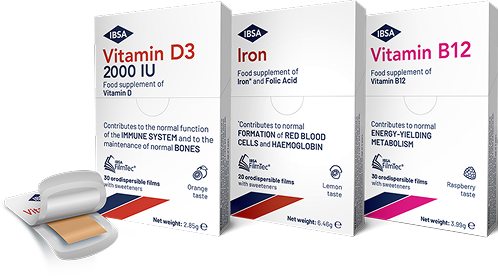What is
Vitamin D?
Vitamin D overview
Vitamin D is a substance primarily produced by the skin through sun exposure, with a small portion obtained from certain foods that contain it. It is a micronutrient, and the body requires only a minimal amount, which is essential for various processes. Vitamin D contributes to the maintenance of normal bones and contributes to the normal function of the immune system, among other things. This vitamin contributes to normal blood calcium levels. Vitamin D3, or cholecalciferol, is the form synthesized by the skin when exposed to UVB rays present in sunlight.
What are the benefits of vitamin D?
What is Vitamin D for?
Vitamin D contributes to the maintenance of normal bones and contributes to the normal function of the immune system. It also contributes to normal absorption/utilisation of calcium and phosphorus.
In this way, it contributes to the maintenance of normal teeth.
Where does
vitamin D come from?
Vitamin D is primarily synthesized by the skin through exposure to sunlight. However, there are also foods rich in this vitamin. Fish (and especially fatty fish and fish liver) have the highest natural content of vitamin D. Egg yolk also has a high vitamin D3 content as the content of vitamin D of meat products varies and depends, among other things, on the contents of vitamin in the fodder.
Further sources of dietary vitamin D are fortified foods (most often milk, margarine and/or butter, and breakfast cereals) and dietary supplements.
When to supplement
vitamin D?
Vitamin D is a contributes to the maintenance of normal bones and contributes to the normal function of the immune system. The primary source of vitamin D3, or cholecalciferol, is the sun, whose rays allow the skin to synthesize vitamin D, though it is also present in certain foods.
Exposure to sunlight is not always possible (especially in winter and autumn) and the amount of vitamin D found in food could not be sufficient. In these cases of low levels of vitamin D the use of food supplements could be helpful, such as Vitamin D3 IBSA food supplement in orodispersible films.

When could low levels of vitamin D occur?
Pre-menopause/menopause
The drop in estrogen levels associated with menopause can lead to a loss of bone mass. That’s why a vitamin D supplement may help, as it contributes to the maintenance of normal bones.
Intense physical activity
For individuals who participate in intense physical activity, Vitamin D supplementation may be helpful. Vitamin D contributes to the maintenance of normal bones and also contributes to the maintenance of normal muscle function, supporting overall musculoskeletal health.
In old age
It is very common for seniors to have low vitamin D levels. This is also because they tend to stay indoors or avoid sunshine. Moreover, in the elderly, the skin produces less vitamin D when exposed to the sun as compared to younger people.

Food supplements should not be used as a substitute for a varied diet and a healthy lifestyle.